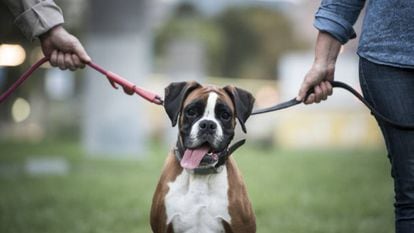When a marriage breaks down, who gets to keep the dog?
Spanish divorce courts are seeing more and more cases of shared custody over a beloved pet


When a marriage breaks down, losing custody of a dog or a cat can sometimes be almost as traumatic as losing custody of a child.
Until now, the courts in Spain had automatically awarded custody to the animal’s registered owner. But in a country where nearly one out of every two households has a pet, this trend is starting to change: a growing body of rulings is taking into account both parties’ emotional attachment to their animal, and establishing shared custody.
I did everything possible to keep her. It’s not quite like a child, but almost
Eva Muñoz, lawyer
“In some cases pets get the same visiting arrangements as children,” notes Leire López, a family lawyer with Vosseler Abogados who says that the issue of who gets to keep the pet “is being openly discussed more frequently in separation proceedings.”
For now, Spain’s Civil Code defines pets as mere “personal property,” a legal status that places some limitations on custody arrangements. But Marita Candela, a law professor and director of the International Center for Animal Law and Policy (ICALP) at Barcelona’s Autonomous University, believes that Spain will soon redress this anomaly and bring legislation in line with countries like France, “which considers pets to be living, feeling creatures.”
The ICALP website compiles all precedents of shared animal custody handed down by Spanish courts.
In 2010, Paqui Barrios became an unintentional celebrity when she filed for “equal time periods” of “shared possession” over Lauda, a mixed-breed dog that she and her sentimental partner had taken in nine years earlier. When their relationship ended, the man kept the animal.

“He took him away and wouldn’t let me see him. He hurt me a lot,” said Paqui at the time. In a pioneering decision, the judge in charge of the case decided to award “shared possession” over the animal. The case set a precedent for animal law in Spain, concluding that the dog, though legally considered personal property, is “indivisible.” As such, he would have to spend half a year with each of his owners.
Six years later, the lawyer who represented Paqui Barrios still remembers the case.
“I keep getting calls from lawyers everywhere to know how I framed the matter,” says Carlos Franco. “Spanish society is more sensitive to this issue nowadays; there is hardly a family around that does not keep a pet. Some people want to make it clear in their marriage covenants that, in the event of a divorce, they want to keep the dog.”
The separation process was more traumatic for Eva Muñoz, a 54-year-old lawyer. The judge gave her custody of their child and awarded alimony. But nothing was said about who would get to keep Estel, the 11-year-old family dog.
In some cases pets get the same visiting arrangements as children
Leire López, family lawyer
“We took her in from the streets when she was two,” recalls Muñoz. Her ex moved to be awarded the right to see the animal every other month. The Provincial Court of Barcelona rejected the claim, saying that the fight over the dog should go through different channels.
But the 2014 ruling did admit that “ties of affection are created between the pet and all members of the family,” and that depriving one of these members of the pet’s company “produces feelings of sadness, unease, anxiety and longing.” The judges who saw the case said that, as “personal property,” a dog can either have exclusive or shared ownership, but that the issue has no place within divorce proceedings because it is legally inadmissible to equate child-visiting rights with dog-visiting rights.
Eva Muñoz says that her husband, an architect, merely wanted to “hurt” her because he knew how important Estel was to her.
“Dogs are used [like weapons], just like children,” she notes. “I did everything possible to keep her. She is paramount to me. It’s not quite like a child, but almost.”
That Muñoz is devoted to her dog is evident: she has spent 22 months taking her in to the vet for daily treatment because of injuries to one of her front paws. Estel is carried around in her owner’s arms, and even shares her bed.
English version by Susana Urra.












































